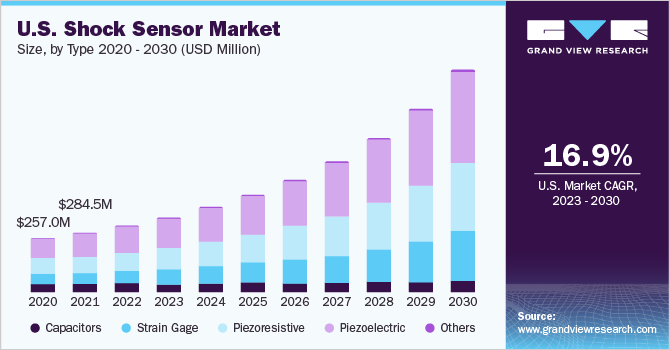-
Nieuws Feed
- EXPLORE
-
Pagina
-
Groepen
-
Events
-
Reels
-
Blogs
-
Market
-
Offers
-
Jobs
-
Developers
Shock Sensor Market 2030: North America’s Tech-Driven Demand
Shock Sensor Market Overview
The global shock sensor market was valued at USD 956.3 million in 2022 and is anticipated to reach USD 4,216.6 million by 2030, registering a compound annual growth rate (CAGR) of 21.0% from 2023 to 2030. Shock sensors, also referred to as vibration or impact sensors, are specialized devices designed to detect and measure sudden impacts, vibrations, or collisions.
These sensors are utilized across various industries, including automotive, aerospace, industrial, and consumer electronics, among others. The rising demand across these sectors is fueled by the need to prevent damage, enhance safety protocols, and enable real-time data acquisition. The integration of Internet of Things (IoT) technology has significantly enhanced shock sensor capabilities. IoT-enabled shock sensors collect and transmit real-time data related to impacts and vibrations. This information is then analyzed to assess the handling and condition of goods, especially during transportation. Additionally, many of these sensors are equipped with GPS tracking, enabling accurate location monitoring and rapid incident response. This technological synergy has transformed operations in logistics, manufacturing, and shipping by enabling predictive maintenance, data-driven decisions, and heightened efficiency.
Order a free sample PDF of the Shock Sensor Market Intelligence Study, published by Grand View Research.

Shock sensors are increasingly being adopted in sectors like shipping, where they are used to monitor and protect cargo. Sensors are embedded in containers and packaging to detect potential damage from shocks or movement. Key industry players are offering advanced IoT-integrated shock sensor solutions. For example, Trusted A/S offers an IoT data tracking solution for the shipping industry that delivers high-resolution data on cargo handling, including graphs, impact detection, and GPS-based incident location data. These solutions support logistics managers in mitigating damage risks during transport, thereby increasing the adoption of shock sensors.
Key Market Trends and Insights
- By Type: The piezoelectric shock sensor segment led the market in 2022, accounting for over 36.0% of total revenue. These sensors generate an electric charge in response to mechanical stress, making them highly effective at detecting structural movement and vibrations.
- By End-Use: The automotive sector dominated in 2022, holding a revenue share exceeding 42.0%. Shock sensors are vital in automotive safety systems, particularly in airbag deployment, where they detect sudden acceleration changes and trigger the airbag system promptly.
Market Size & Forecast
- 2022 Market Value: USD 956.3 Million
- 2030 Forecast Value: USD 4,216.6 Million
- CAGR (2023–2030): 21.0%
- Largest Market (2022): North America
- Fastest Growing Region: Asia Pacific
Competitive Landscape
The shock sensor market is moderately fragmented, with several small and mid-sized players contributing to innovation and competition. Companies are increasingly focusing on enhancing product features such as real-time monitoring, GPS integration, and IoT connectivity. These technological advancements are expected to significantly drive market growth in the coming years.
In February 2023, for instance, Texecom—a security-focused firm—launched the Impaq S G3, a Grade 3 shock sensor featuring viber accelerometer technology. Designed for premium commercial and residential applications, it offers high-accuracy vibration detection, reflecting the growing emphasis on precision and advanced capabilities in the market.
Key players operating in the global shock sensor market include:
- TE Connectivity
- PCB Piezotronics, Inc.
- Honeywell International Inc.
- DYTRAN INSTRUMENTS INCORPORATED
- Murata Manufacturing Co., Ltd.
- Mobitron AB
- Meggitt PLC
- SpotSee
- SignalQuest, LLC
- Climax Technology Co., Ltd.
Explore Horizon Databook – The world's most expansive market intelligence platform developed by Grand View Research.
Conclusion
The global shock sensor market is poised for robust growth, driven by increasing applications across diverse sectors and the integration of advanced technologies such as IoT and GPS. With a projected CAGR of 21.0% through 2030, the market is being shaped by a strong demand for real-time monitoring, enhanced safety, and operational efficiency. Innovations by key players and the rising need for damage prevention in logistics and automotive sectors are expected to sustain this momentum over the forecast period.
- Art
- Causes
- Crafts
- Dance
- Drinks
- Film
- Fitness
- Food
- Spellen
- Gardening
- Health
- Home
- Literature
- Music
- Networking
- Other
- Party
- Religion
- Shopping
- Sports
- Theater
- Wellness
- Cryptocurrency

